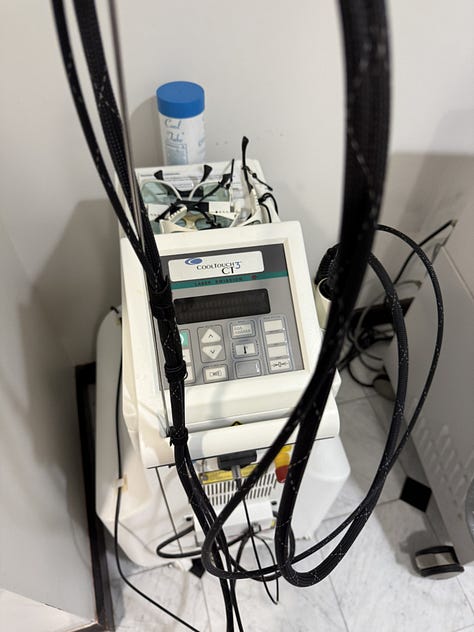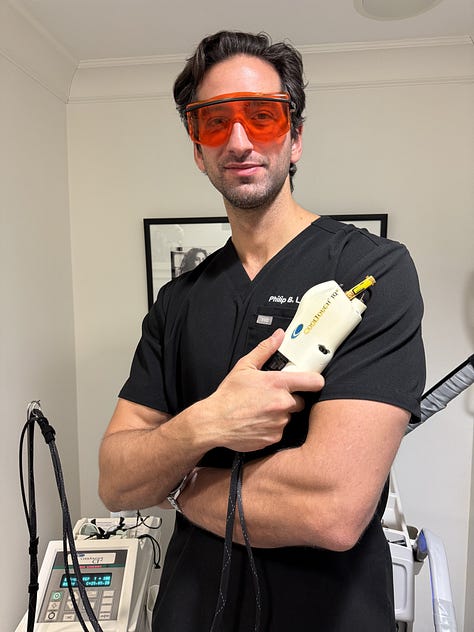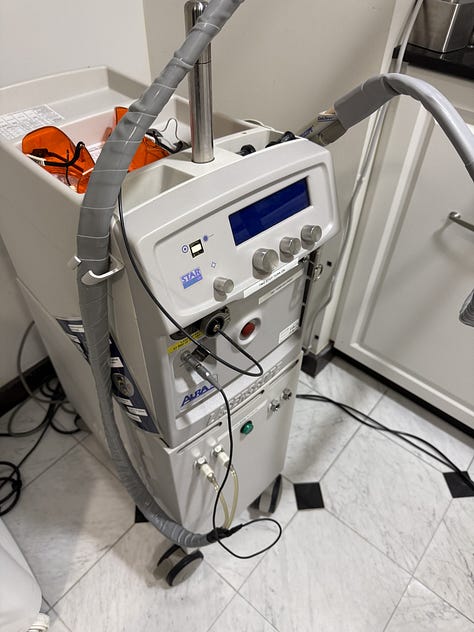Juicy Stuff My Plastic Surgeon Told Me
We talk bad blepharoplasty, the perfect time for a facelift, and more with Dr. Philip Lotfi - if you're ... into this ... stuff.
I haven’t had any facial plastic surgery (YET, laalaoalololol) but I love to go see Dr. Philip Lotfi, board-certified plastic surgeon on the UES on Manhattan for regular laser treatments on said face. He’s a facelift specialist. One day, he will tighten my face. And I simply do not care what you think about that! Face lift = wellness (to me).
Because we’re pals I like to ask him all kinds of questions to prepare for my future chop-chops while I’m getting my face zapped by the Cool Touch3 and Aura lasers for smoothness, tightness, and even skin tone. During a recent visit I interviewed him to share with you what we’re curious about right now in the world of facial plastic surgery. We discussed everything from how a surgeon knows a candidate is ready for surgery vs. non-surgical treatments, all the blepharoplasty we’re seeing out there all of a sudden, what really causes aging, and more.



It’s a very informative interview (and long, but absolutely worth the entire read - it is your face we’re talking about after all). Plus, at the end of this post don’t forget to check out all the wellness stuff I’m loving this week, and don’t mind the clothing selects bc remember, EVERYTHING IS WELLNESS.
Here’s the full-fat milky latte of an interview for you to enjoy:
Lo:
What emerging trends or technologies are you most excited about right now in facial plastics?
Dr. Lotfi:
I’m really excited to see a shift towards more natural and subtle results. People are moving away from that overdone, overfilled look and focusing more on treatments that enhance their natural beauty. We’re seeing fewer drastic surgeries and less filler, and more emphasis on skin treatments like microneedling and lasers—things that rejuvenate the skin without changing someone’s facial features.
Lo:
Do you think this shift is due to advancements in technology? Can non-surgical treatments really achieve a noticeable difference now?
Dr. Lotfi:
Absolutely. Over the past decade, there’s been a huge focus on developing treatments that target the skin and even the subcutaneous tissues. We now have technologies that tighten muscles and fat beneath the skin, leading to more effective, non-invasive results.
Lo:
So treatments today can make a real difference without surgery?
Dr. Lotfi:
They can. Of course, nothing will fully replace a facelift when someone ages significantly, but these intermediate treatments can help people maintain youthful skin longer. Plus, when they do eventually opt for surgery, their skin is healthier, leading to better and longer-lasting results.
Lo:
So, how do you achieve natural-looking results while still meeting your patients’ aesthetic goals? I assume some people want to look very different from where they’re at when they come in for a consult.
Dr. Lotfi:
Setting expectations is key. My goal is to help people look younger and healthier without changing who they are. I want someone to look in the mirror and think, “I look amazing,” but not see a totally different face. It’s about enhancing what’s already there.
Lo:
Are there surgeons who do cater to patients wanting more dramatic transformations?
Dr. Lotfi:
Definitely. Some patients want a very pulled or overdone look, and there are surgeons who will deliver that. But my aesthetic leans towards subtlety. I’d rather someone look refreshed without others being able to tell they’ve had work done. With fillers, I focus on restoring lost volume rather than creating new shapes. With Botox, it’s about softening lines, not freezing the face.
Lo:
Do patients ever feel conflicted paying high prices for subtle changes? I think that’s a little bit hard for people to wrap their heads around, you know what I mean?
Dr. Lotfi:
It comes up. Some patients wonder if they’re getting their money’s worth when results are subtle. But I always explain that you're paying for quality, precision, and expertise—not the quantity of work done. Less is often more in facial aesthetics.
Lo:
What’s the most misunderstood procedure you perform in your practice? Is there one that’s particularly surprising or controversial in the eyes of the public?
Dr. Lotfi:
I’d say the recovery process for most surgeries is actually the biggest surprise for patients, more than a misunderstood procedure. Take rhinoplasty, for example—swelling can last up to a year before you see the final result. Even with facelifts, that last 10–15% of swelling can linger for months. People often expect immediate results, but it really takes time for the tissues to settle.
Lo:
Why does it actually take so long?
Dr. Lotfi:
The face has a rich blood supply, and after surgery, tiny blood vessels leak fluids to promote healing. That leaky phase can last for months, and because we’re so focused on the fine details in facial aesthetics, even a small amount of swelling can make a difference. We’re talking millimeters after a year, but to me in my practice, those millimeters are notable.
Lo:
So how do you decide if someone is a candidate for surgical versus non-surgical treatments? Do they decide and tell you, or do you make the final call?
Dr. Lotfi:
It’s all about timing and skin quality. For a facelift, for instance, I look for a certain level of skin laxity. There’s a sweet spot where the skin has enough looseness to benefit from surgery but not so much that the results won’t be as effective. Acting too early means the surgery may not be worth it, but waiting too long can limit results.
Lo:
So it’s about timing it just right?
Dr. Lotfi:
Exactly. The same goes for eyelid surgery or "blepharoplasty." You want to wait until there’s enough excess skin to make the procedure worthwhile, but not so much that it affects function or aesthetics.
Lo:
I’ve been seeing so much blepharoplasty out there — even younger women are getting it. I want this procedure, I feel like my eyelids have a lot of laxity. What’s your take?
Dr. Lotfi:
Blepharoplasty should be subtle. The goal is to remove excess skin without changing the shape of the eye. Sometimes, when paired with other procedures like brow lifts, the shape can change. But if too much skin is removed during the blepharoplasty alone, it can affect eyelid function and even cause issues with closing the eye fully.
Lo:
I am seeing a lot of these procedures online and the result is a very different looking person. But, if done correctly, it should just make you look more awake? I really want this procedure soon.
Dr. Lotfi:
Exactly. You should look refreshed, not different. You’re a little ways out from being a candidate.
Lo:
Okay - next question: in your experience, how much of aging is genetic versus lifestyle, and what can people do to age gracefully?
Dr. Lotfi:
Aging is largely genetic, especially when it comes to skin thickness and elasticity. But lifestyle plays a huge role too. Sun exposure is the number one environmental factor that ages the skin. I always recommend daily sunscreen, even in winter. Hydration, proper skincare, and using ingredients like retinol also make a big difference. Retinol, or Vitamin A, helps with cell turnover but also makes skin more photosensitive, which is why it should be used at night.
Lo:
Thankfully we wear our sunscreen everyday around these parts. But I’ve always wondered why can’t you wear retinol, a version of Vitamin A in the sun? That’s always a major warning on retinol products but I don’t actually know why. I just assume you get a sunburn more quickly if you’re wearing it during the day?
Dr. Lotfi:
The retinol molecule itself is sensitive to the sun and can be less effective with sun exposure, which is why we recommend extra sunscreen when using retinol products, or using them at night. Retinols wont make you more susceptible to a sun burn per se but it will make the skin more sensitive in general.
Lo:
Okay, truth time. Do environmental factors like pollution really impact aging? I see all these antioxidant facial skincare products now and I have no clue how to assess whether this is a bunch of snake oil, or something we should take seriously.
Dr. Lotfi:
There’s definitely an impact, but it’s harder to quantify. Pollution can cause oxidative stress on the skin, leading to premature aging. It’s why antioxidant serums, like those with Vitamin C, are so popular—they do help combat that damage.
Lo:
This was so insightful. Thanks so much for your time, Dr. Lotfi.
Dr. Lotfi:
It was my pleasure!
What other questions do you have for the good doctor? I’ll ask next time I see him for a follow-up interview. Slam that comment button to leave your Q!
EVERYTHING IS WELLNESS
The bits and bobs and jeans and moisturizers and more I’m loving this week:
Bala Bangles in this gorgeous blue color (I have the 3lb weights)
The Green St. jeans/pant by TWP. Cannot find anything more chic.
These white wide leg white jeans that have me SO ready for spring walks by Veronica Beard.
This dopamine menu yellow and green glass flower vase by Noon and Moon
The Barrier Bioactive Treatment for nighttime skin perfection by U Beauty





What causes dark circles under eyes and how can I reduce their appearance
My other comment for Dr phil is - what’s the right way to go about dissolving filler